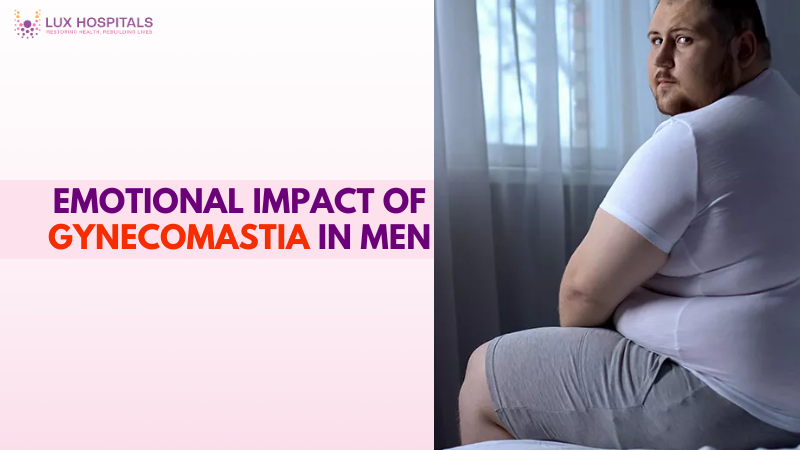The Emotional Impact of Gynecomastia in Men

Up to 60% of men will have gynecomastia, or the enlargement of their breast tissue, at some point in their lives. Gynecomastia can have a range of physical symptoms. Still, it can also have a profoundly upsetting and long-lasting emotional impact. This blog explores how gynecomastia affects men emotionally, socially, and psychologically, and what can be done to support those struggling with it.
What Is Gynecomastia?
An excess of glandular breast tissue develops in men with gynecomastia, a medical disorder marked by an imbalance in estrogen and testosterone levels. One or both breasts may be affected, and it can develop in childhood, as people age, or as a side effect of medications or illnesses. Gynecomastia is generally benign, but its psychological impact sometimes outweighs its physical implications, leading to social anxiety, low self-esteem, and shame.
How Treatment Helps Emotional Recovery?
The emotional impact of gynecomastia often improves with the right treatment plan. Whether through lifestyle changes, surgery, or therapy, addressing both the physical and emotional sides of the condition is crucial. Below are key treatment options and how they support long-term emotional healing.
1. Shame and Social Withdrawal
One of the most common aspects of the emotional impact of gynecomastia is shame. Many men feel uncomfortable taking off their shirts at the beach, gym, or during intimate moments. This discomfort can lead to social withdrawal, skipped events, and an unwillingness to participate in activities they once enjoyed. Psychological distress can also result in isolation and avoidance behaviors. Even casual conversations on body image might cause a heightened sense of self-consciousness.
2. Body Image Issues and Self-Esteem
Men’s self-perception is also impacted by the emotional toll that gynecomastia takes. Self-worth and confidence are significantly influenced by one’s body image, particularly in today’s image-driven society. Men with gynecomastia may compare themselves to idealized male bodies seen in media and advertising, leading to feelings of inadequacy. These negative perceptions can cause a drop in self-esteem and reduce a man’s overall sense of masculinity. One or both breasts may be affected.
3. Depression and Anxiety
Many men experiencing gynecomastia face underlying emotional challenges such as depression and anxiety. Healthcare professionals frequently ignore the emotional toll that gynecomastia can take, even though it can be severe enough to interfere with social relationships, sleep patterns, and work performance. Men may feel “less than” or ashamed of their bodies, which can lead to persistent feelings of sadness or worry. In circumstances where the chest may be exposed, anxiety might become more noticeable.
4. Impact on Intimacy and Relationships
The emotional impact of gynecomastia extends into intimate relationships as well. Men may completely shun dating or sexual activities out of fear of rejection or mockery from romantic partners. Relationship satisfaction may suffer as a result of this fear of vulnerability, which can also hinder emotional intimacy. Even in long-term relationships, the partner’s support may not fully erase the insecurity felt by the man.
5. Mental Health Stigma in Men
Men are socialized to suppress their feelings and refrain from talking about their body issues in many societies. Because of this, dealing with the psychological effects of gynecomastia is especially difficult. Because they fear being perceived as weak or overly sensitive, men may suffer in silence. Men may be discouraged from obtaining medical or psychiatric assistance because of this stigma.
6. Seeking Medical Help and Support
Recovery begins with acknowledging the emotional toll that gynecomastia takes. A precise diagnosis, along with the available treatment options, can significantly improve one’s physical and mental health. This could involve changing one’s lifestyle, taking medication, or having surgery. Low self-esteem or emotional trauma can also be addressed with therapy or counseling.
Treatment Options and Emotional Recovery
- Treating the condition can often relieve much of the emotional impact of gynecomastia.
- Some individuals may experience a reduction in breast tissue through weight loss or by discontinuing certain medications.
- For long-lasting results, gynecomastia surgery (male breast reduction) is often an effective option.
- Emotional recovery takes time and usually benefits from professional mental health support, such as counseling or therapy.
- A multidisciplinary approach, combining medical treatment and emotional care, offers the most comprehensive and effective recovery.
Conclusion
Men’s gynecomastia’s emotional toll is a genuine, frequently disregarded problem that merits more attention. And empathy. From shame and low self-esteem to anxiety and relationship struggles, the condition can take a toll far beyond the surface. But the good news is that help is available—both medical and emotional support can dramatically improve quality of life. We can help guys with this issue by dispelling the stigma and promoting candid discussions. On their path, no one should feel isolated.
Frequently Asked Questions
Yes, gynecomastia can have disastrous emotional implications. Typically, it leads to social disengagement, low self-esteem, and feelings of humiliation. These mental difficulties may also result in anxiety or despair. The mental anguish can be unbearable, and the condition is not only physical. Professional and family support is essential.
Romantic relationships may be impacted by the emotional toll that gynecomastia takes. Men may shun intimacy or dating entirely because they feel self-conscious about their physique. Emotional intimacy may be diminished, and current relationships may be strained as a result of this uneasiness.
Yes, the emotional effects of gynecomastia include melancholy and anxiety in many guys. Persistent melancholy or fear in social situations can result from constant concern about one's looks. If nothing is done, these mental health conditions may get worse. Support groups and therapy are helpful resources for controlling these feelings.
Because of cultural pressure to be strong and macho, men frequently experience embarrassment. These beliefs are challenged by the emotional impact of gynecomastia, which makes men feel "less male." Many people are discouraged from speaking up because of this stigma.
Admitting and receiving treatment for gynecomastia is the first step in controlling its emotional repercussions. Therapy, support groups, and candid conversations with loved ones can all be very healing. Medical treatment can also reduce physical and emotional discomfort.




















